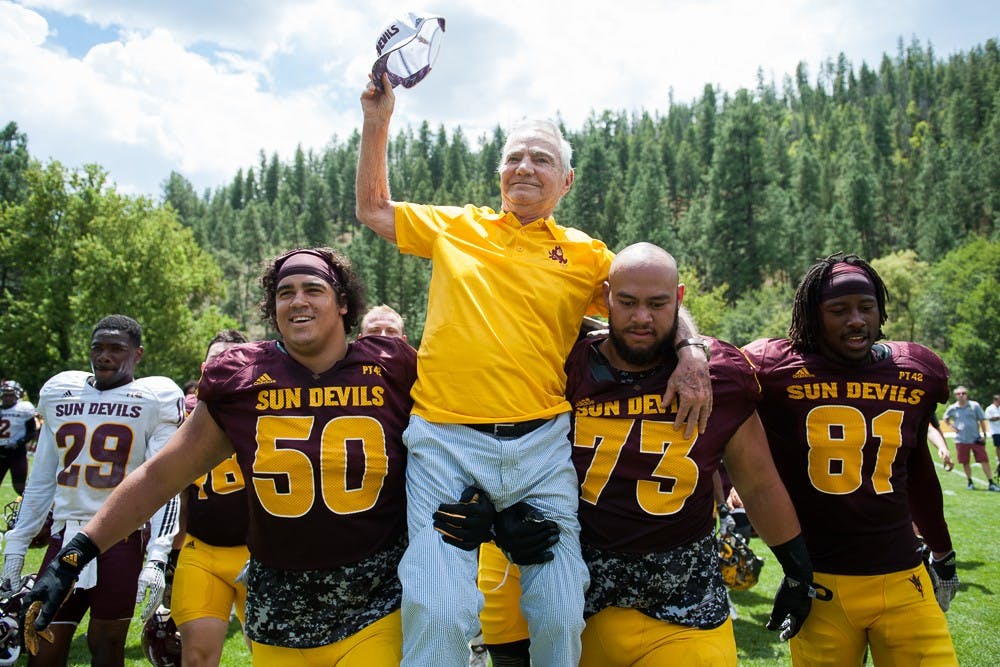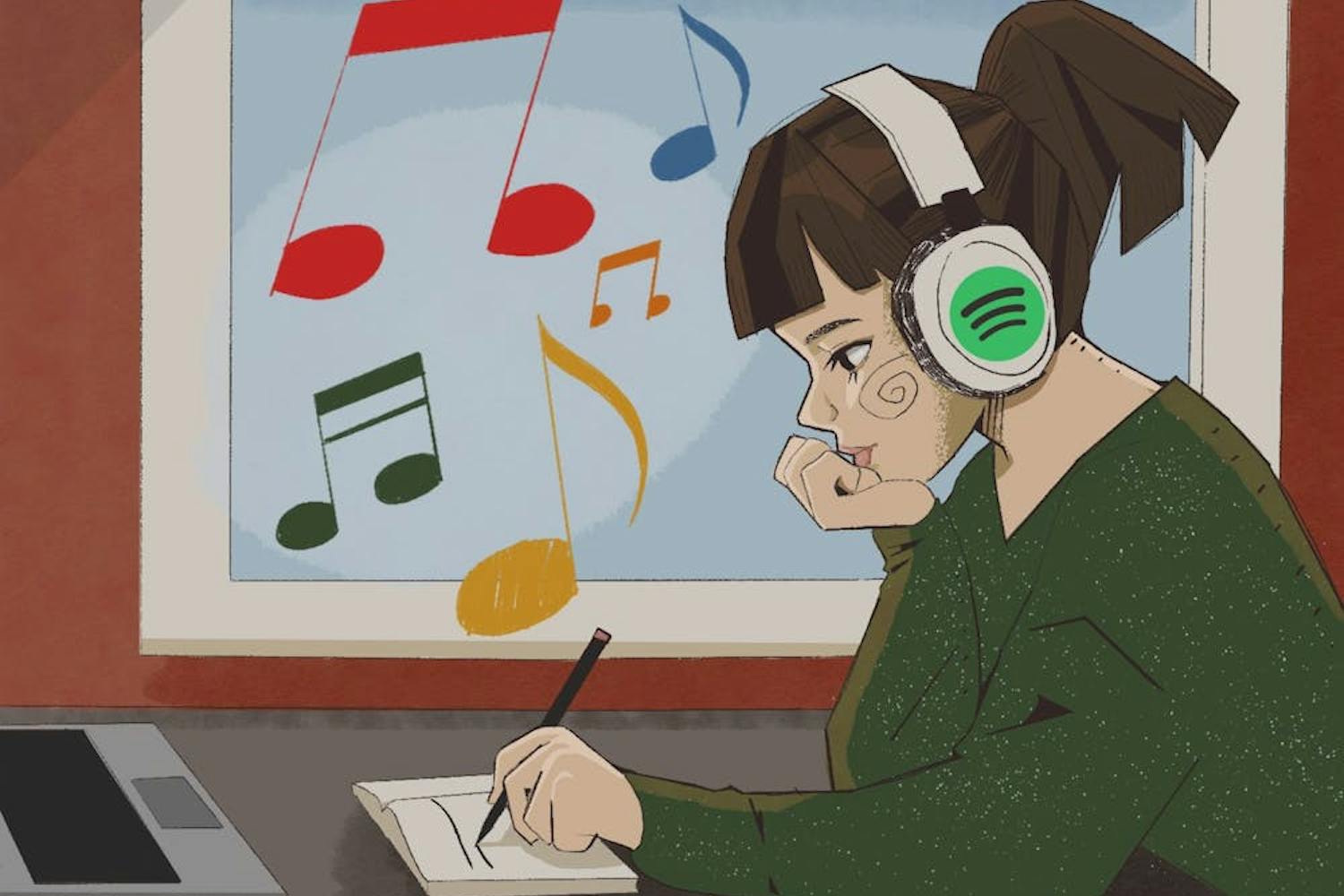On June 22, legendary ASU football coach Frank Kush passed away at the age of 88.
The College Football Hall of Famer coached the Sun Devils for 22 seasons and complied 176 wins, the most by any coach in program history. In 1955, the Windber, Pennsylvania native began his tenure at Arizona State as an assistant coach under then-head coach Dan Devine. On December 22, 1957 Kush became the 15th coach in team history.
Under Kush, the Sun Devils won seven Western Athletic Conference Championships and finished with a winning record in 19 of his 22 seasons at the helm. Elected to the College Football Hall of Fame in 1995, Kush led his team to a 6-1 record in bowl games, including the 1970 Peach Bowl over North Carolina and the 1975 Fiesta Bowl over Nebraska.
Both wins against the Tar Heels and the Huskers completed undefeated seasons, and the 1975 win catapulted ASU to second in the national rankings, the highest single-season finish under Kush.
With a public viewing for Kush set to take place July 5, The State Press sat down with four of his former players to reflect on Kush's legacy as a coach and a person and to share memorable stories and experiences.
Ron Erhardt was a running back at ASU from 1956 to 1958. During his three seasons, according to College Football Reference, Erhardt complied nine touchdowns and averaged 3.7 yards per carry.
Mike Haynes played defensive back for ASU in the 1970's. In his four seasons, he was a two-time All-American and a three-time all-Western Athletic Conference team selection. In his junior year, he picked off 11 passes, the most in the country and was a member of the 1975 team as a senior, that finished No. 2 in the country. Haynes was drafted into the NFL in 1976 by the New England Patriots and won the Super Bowl twice with the Oakland Raiders. In 1997, he was elected into the College Football Hall of Fame.
Steve Matlock played on the offensive in the 1970's for the Sun Devils. He was a member of the 1970 Peach Bowl winning team and two Fiesta Bowl winning teams. As a senior in 1972, the year the Sun Devils won their second straight Fiesta Bowl, Matlock served as the team captain.
Danny White played quarterback at ASU in the 1970's and compiled legendary career numbers. In four seasons, he was 33-4, won three Fiesta Bowls and set seven NCAA passing records. White's No. 11 is retired and he played for the Dallas Cowboys from 1976 to 1988.
Frank Kush's family announces public viewing. Plus, @FootballASU and @TheSunDevils plan to honor Coach Kush this season. #12Sports pic.twitter.com/NQSQTsQczt
— Cameron Cox (@CamCox12) June 27, 2017
Q: When you found out Kush passed away, what popped into your mind first?
Erhardt: Since we all started out together around the same time at Arizona State, my team, in 1955, was part of an era. Frank (Kush) had done everything I think he wanted to do. I know that he was comfortable with his relationship with his players and ASU and I don't know how bad he was at the actual end, but I think he accomplished his goals.
Haynes: I talked to him not too long ago, like in the last few weeks. I talked with Danny (White) beforehand, and he told me what to expect on the call. When we (Haynes and Kush) finally connected, he seemed to be great, except he kept repeating the same questions, so I knew something was going on. But, I am glad I got a chance to talk to him.
Matlock: A lot of emotions that were conjured up by all the time we spent there, and all the hard work we put in. It made me reflect a lot on coach and how important he was on our lives at very formidable ages,18, 19, 20 years old, and the impact he made not only on us as individuals but on the team, the University, the coaches, the administrators, the boosters. Coach was pretty well intertwined.
White: His lifestyle has not been good for several years and so I was happy that his pain was gone and in a better place. Mine was more of a feeling of relief for him, than anything else.
Legends are never forgotten.
— Pac-12 Network (@Pac12Network) June 22, 2017
You will be missed, Coach Kush. pic.twitter.com/U78pXRG0Pg
Q: During your time with Kush, what stood out about him?
Erhardt: Later, (after his career ended) I hung around in Arizona and had a career in the title insurance business for 50 some-odd years. Many times, after the years go by, I would run into many situations where somebody would day 'we don't know how to do this' or 'how much harder do we have to work.' I think the background that I got from Frank, and all of the other coaches, I just knew what to do and how to do it.
Haynes: He was a perfectionist in a lot of ways and because you could never have an excuse, I had to learn that the hard way. I was trying to find excuses. We used to practice at night because it was so hot in the afternoon. I tried to outsmart him and took a night class so I wouldn't have to go to all the practices, and he said, 'Oh you better go tell your teachers you're going to be missing the first few weeks, because you're not going to miss these practices.' He didn't care who he had to single out to make a point.
Matlock: As an offensive lineman, believe me, Michael and Danny were looked at in a very different light. They were white-collar workers and we were blue-collar workers. We didn't spend a whole lot of time receiving any accolades. Everybody knew it and it was no big deal. We had this incredible camaraderie with each other because of our position with coach.
White: The way he pushed us to be the best we could be. Winning always make a lot things go better and we won a lot. As a result, me and my teammates are still close to this day.
Q: What did you learn from Coach Kush?
Erhardt: Frank really enjoyed being a trainer and push to do more than you possibly thought you could do. More than anything, I think the substantial number of players that were drafted into the NFL, they were trained, they knew what to do, it was frankly a matter of the competition they had. Frank is a real trainer. He had time to work on the guys and that started back in the middle 50's when I was there.
Haynes: How much he hated to lose and how he did not like any good excuses. There were no good excuses for losing or making a mental error, dropping a pass. He was as tough as they come. You couldn't look at some guy who might have been bigger, faster, stronger than you and say, 'Coach, he is bigger, faster and stronger.' You knew that wasn't going to work with Coach Kush. You worked your butt off to stay in shape and ready for whatever challenge.
Matlock: If there is one thing I can think of, and this is something I try and instill in my kids, I have two boys who play college football, is fearlessness. You were not afraid of anything. When you went into battle, we had no fear of failure. We weren't as big, we weren't as fast, but we were tougher than the other guys.
White: The biggest thing is you can probably handle a lot more than you think you can, if you set your mind to it and the key to success, whether it's as a husband, a father or a businessman, is mental toughness. Just being able to deal with adversity and things that don't always go your way, because they don't.
Danny White has a story about Coach Frank Kush that ... well, you should just listen to this https://t.co/2O1jvVwCiR
— AZ State University (@ASU) June 24, 2017
Q: Did you stay in touch with Coach Kush after your playing days?
Erhardt: We lived in the same neighborhood. We were able to help Frank do a couple of things that he enjoyed to do. We would go play basketball games together and he had a few situations with my children and his friends that he participated in.
Haynes: The good news is I got a chance to know him after college. He was a different guy. Our relationship, between me as a player and as a graduate of Arizona State, was different. We would go to lunch together over at the golf course and we would talk about different things that were going on in mine or his life and different things he would like to see us accomplish as alumni.
Matlock: Oh yeah. When he got done coaching, I had my business in town at the time and he would come and visit and talk about other players and different stuff. A couple of other guys and I would get together with Frank and have lunch. He was a very personable guy, a lot different than playing offensive guard for the Sun Devils.
White: I was able to spend time with him at banquets and we had a birthday party for him every year at ASU. I was at least in contact with him on a regular basis, eight or ten times a year.
Reach the reporter at jjacquez@asu.edu or follow @joejacquezaz on Twitter.
Like State Press Sports on Facebook and follow @statepresssport on Twitter.




